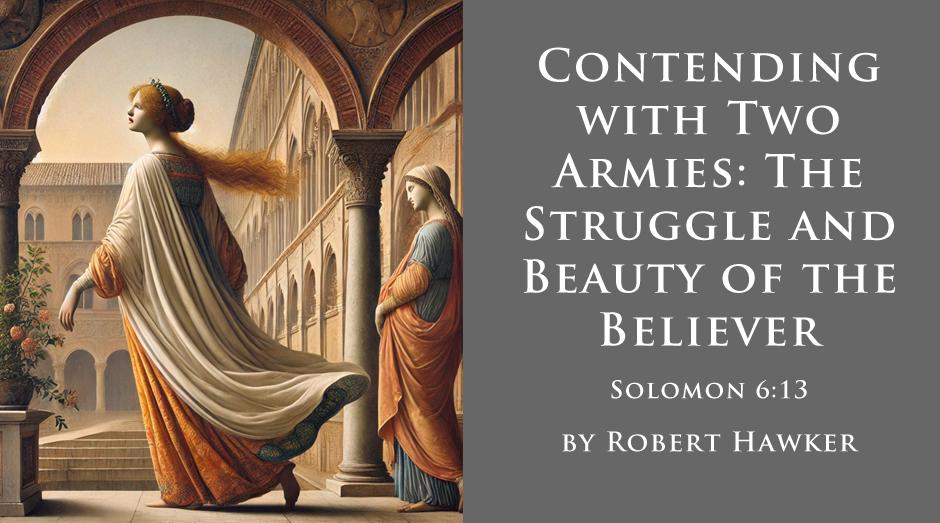Contending with Two Armies: The Struggle and Beauty of the Believer

Contending with Two Armies: The Struggle and Beauty of the Believer
August 30—Morning—Deuteronomy 15:15
"And you shall remember that you were a slave in the land of Egypt, and the Lord your God redeemed you."—Deuteronomy 15:15.
Tell me, my soul, can you ever forget the bitterness of that state of nature from which the Lord your God brought you? Imagine the most terrible state of captivity the world has ever known; and what could all of that be, limited as it is by the short span of human life, compared to the everlasting bondage of sin and Satan in which you lay when Jesus passed by and brought you out? No galley slave, chained to the oar, could match your misery, bound by the chain of sin. No temporary suffering could compare to that endless state of woe to which you were exposed.
You were a slave to the power of sin, to the love of sin, to the desire for sin, to the punishment of sin; a slave to the law of God, to the justice of God, to the displeasure of God, to the threats of God; a slave to your guilty conscience; a slave to your corrupt desires—not just one desire, but many, serving, as the apostle says, "various lusts and pleasures, hateful and hating one another"; a slave to Satan, a willing servant, wearing his uniform, delighting in his service, though filled with sorrow, frustration, and disappointment, and whose wages were certain death; a slave to the fear of many creatures in creation, many of whom had the constant power to trouble and distress you; a slave to the fear of death, hell, and the judgment to come!
Was this your state, my soul, by nature and by practice? And has one like the Son of Man brought you out? Precious Jesus, what shall I say to you, what shall I say for you? What shall I render to the Lord for all the mercies he has done to me and for me? And do you say, Lord, that I should remember that bondage and your redemption? Oh, may my tongue cling to the roof of my mouth if I forget you, the Author of all my joy and all my happiness! No, I will remember you and prefer your love above all else.
In life, in death, and for all eternity, may my soul cling to you, like a bee to a flower; and let the fragrance of your name be like ointment poured forth.
August 30—Evening—Song of Solomon 6:13
"Return, return, O Shulamite; return, return, that we may look upon you. What will you see in the Shulamite? As it were the company of two armies."—Song of Solomon 6:13.
It is the church that is being called upon to return, most likely by the daughters of Jerusalem. Some have thought the church is called the "Shulamite" as being of Salem, or Shulem, a shortened word for Jerusalem. Others have thought that "Shulamite" could be the feminine form of Solomon, representing the church as his bride. Still, others have suggested that since "Jerusalem" means peace, the church is called so because of her loveliness. Indeed, in every sense, the church may well be called the Shulamite: being married to Christ; being of the "Jerusalem above, which is the mother of us all"; and being beautiful, peaceful, and lovely in Jesus, as Jerusalem is the praise of the whole earth (Psalm 48:2).
But why is the Shulamite called upon to return to be looked upon, and with such earnestness, that the request is repeated so often? The answer is quite clear. If it refers to a soul's initial conversion, the change from death to life, from sin to salvation, is so great that everyone might be eager to see it. If it refers to the return of a believer after a period of backsliding, the humble and repentant state of such a soul would be a beautiful sight to all who love to witness the blessed fruits of the Holy Spirit. And if it is in the later stages of a life of grace, when a believer, through a long journey with Jesus and sustained by him, becomes beautiful and mature in their faith, there is no greater object of delight or one more worthy of attention on earth.
Thus, in any sense, the earnest and repeated call for her return to be looked upon can be well understood. The church's response is equally engaging: "What would you see in me?" As if she had said, "In my best and highest state, I am still a poor creature in myself. All my beauty comes from Jesus. I am indeed beautiful in him; he is my glory and the lifter of my head. But in myself, I am merely one contending with two armies. I feel corruption constantly rising against grace, and when I want to do good, evil is always present with me."
My soul, is this not your very state? Are you not constantly engaged in this struggle? Precious Lord Jesus, let this view of your church comfort me with the awareness of a family resemblance. And, oh Lord, while I groan under the remains of indwelling sin, let me see that they are only remnants. Jesus will, in time, and little by little, drive these Canaanites out of the land.
